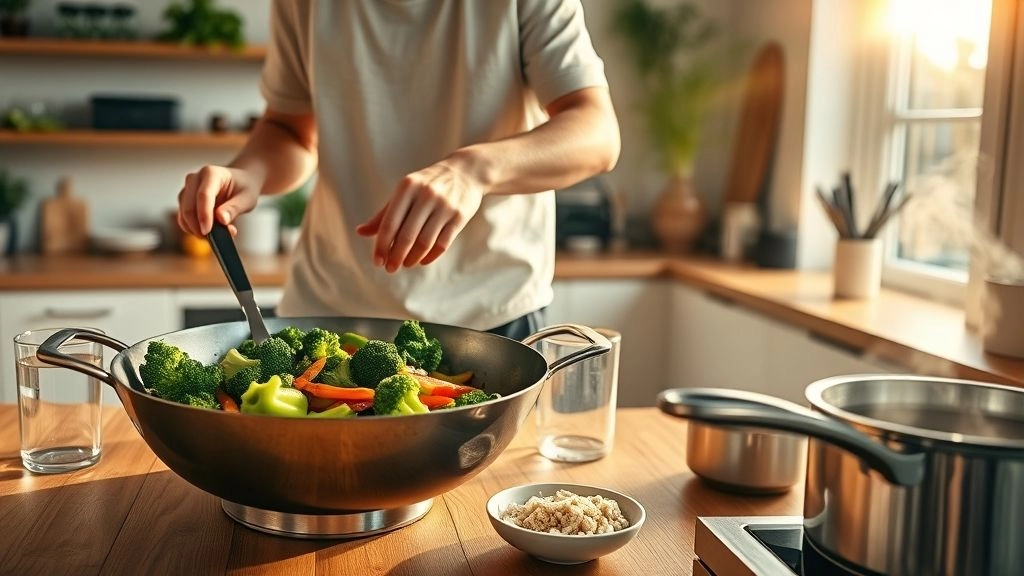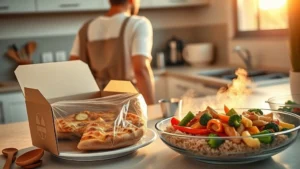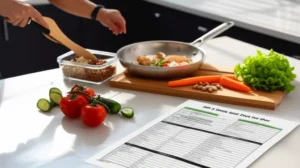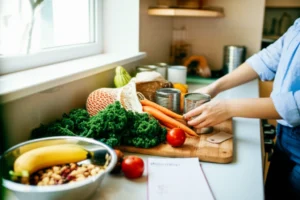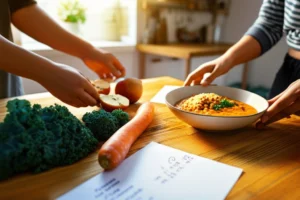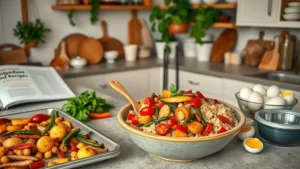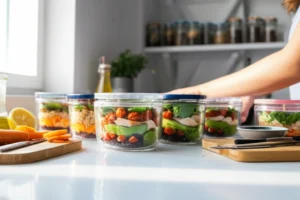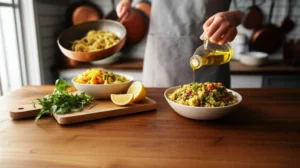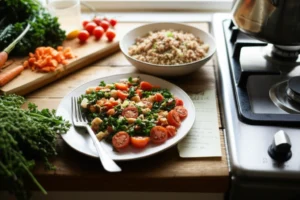Okay, so let’s get real about food and money. You’ve probably heard that cooking at home is healthier, saves cash, and is good for your family. But how much of that is true, and why should you care? Honestly, if you’re like me and juggle a million things, cooking at home can feel like a chore — or even a luxury. But stick with me. There’s a ton more to it than just saving a few bucks or avoiding dirty takeout boxes.
Here’s the deal: If you switch up just one or two meals a week from eating out to cooking at home, not only could you save hundreds, but you might start feeling better, too. And it really doesn’t have to be fancy or perfect. Let’s dive into why is cooking at home healthier—and how it can quietly boost your well-being and your wallet, even on the craziest days.
Home Food Wins
Why Does Home Cooking Feel Different?
Have you ever noticed how you feel after a big restaurant meal? Bloated, maybe a little sluggish, or just… heavy? That’s no accident. Studies from places like Johns Hopkins show that people who cook at home regularly consume fewer calories, less fat, and less sugar than folks who eat out a lot—even when they aren’t trying to lose weight. The average person who cooks six or seven nights a week takes in about 2,164 calories daily, compared to 2,301 calories for those cooking once or less per week. Sounds small, but over time? That adds up.
Even on the days you do eat out, people who cook more tend to make slightly better choices or eat less. Weird, right? But it makes sense when you think about it—once you’re used to managing portions and ingredients, restaurants start feeling a bit overwhelming with all that salt, fat, and sugar.
Calories and Salt: Takeout vs. Your Kitchen
| Meal Type | Calories (approx.) | Salt Content | Quality |
|---|---|---|---|
| Fast Food Burger | 1200+ | High sodium, processed | Low nutrient density |
| Home-Cooked Stir-fry | Under 600 | Controlled salt | Fresh, whole ingredients |
For a quick example, I swapped my usual pizza nights for homemade quesadillas packed with veggies. I felt lighter the next day, and my grocery bill didn’t spike either. If you want to see some solid numbers on this, check out Eating out vs cooking at home Statistics. It’ll surprise you.
Even “Unhealthy” Home Food Can Be Better
Don’t stress if your go-to is comfort food or something that isn’t exactly Instagram-worthy. Believe it or not, even if your home cooking involves mac ‘n’ cheese or a juicy burger, it’s still likely healthier than takeout or fast food. How? Because you control the ingredients—and the portions.
I came across a Reddit discussion where people talked about how takeout meals sneak in tons of hidden fat, salt, and sugar. So even if your home meal isn’t gourmet, it’s usually less processed and doesn’t pack in the added junk. Plus, eating from your own kitchen makes portion control so much easier. Win-win for your health and your budget.
Money Talk
Is Cooking at Home Really Cheaper?
Look, I get it. Sometimes it feels like eating out is easier, especially if you’re cooking for one. But let me ask: have you ever sat down and done the math on how much a week of solo takeout actually costs versus cooking? It’s not close.
One of my friends started batch-cooking chili and soup, and over a month she saved nearly $200. That’s not small change! According to Why cooking at home is cheaper essay, cooking in your own kitchen, even accounting for groceries, cuts down cost by a substantial margin compared to regular takeout or restaurant dining.
One-Person Meal Prep Hacks
If you’re living solo and wondering Is it cheaper to eat out or cook for one person, here’s a quick hack: cook once, eat twice. For example, make a big batch of rice or pasta and freeze half for later. Cook double portions of chicken or veggies and use leftovers creatively—for tacos, salads, or wraps throughout the week.
Having staple pantry items like canned beans, frozen vegetables, and frozen fruit makes whipping up quick meals a breeze—and lessens the temptation to order something expensive or unhealthy.
Pros and Cons: Home vs. Eating Out
Let’s weigh the good and the not-so-good, friend-style. Home cooking checks major boxes on health and savings, but it takes upfront time and effort. Dining out is obviously convenient, but comes with sneaky hidden costs—in calories and dollars.
| Factor | Home Cooking | Eating Out |
|---|---|---|
| Cost | Lower, especially batch cooking | More expensive, convenience premium |
| Health | Control ingredients, less sodium | Generally higher sodium, fat, calories |
| Convenience | Requires prep and cleanup | Quick, no prep |
| Social | Family bonding, creativity | Often solo or crowded |
Feeling curious? Swing by the Eating out vs eating at home pros and cons page for a deeper dive. You might find your own balance knowing what costs and benefits matter most to you.
Keep It Easy
Batch Cooking = Time & Money Saved
If you’re overwhelmed by the idea of cooking every single day, batch cooking is your new best friend. It means cooking a big chunk of food at once, then dividing it into meals to freeze or refrigerate. Boom—more meals with less daily work.
Plus, batch cooking has been shown in medical research to help you stick to dietary guidelines without extra cost or effort. Imagine making a pot of chili that feeds you for half the week—easy meals that won’t wreck your budget or your health.
Try These for Batch Cooking
- Soups and stews (freezes well, hearty)
- Pasta dishes with plenty of veggies
- Chili with beans and lean meat
- Casseroles that reheat nicely
Small Tools, Big Difference
You don’t need a full-blown kitchen makeover. A slow cooker or Instant Pot can do wonders, making cooking hands-off and freeing up your time for other things. A mini-chopper or a blender can speed up prep and turn you into a speedy home chef in no time.
Having these tools has saved me more than a few nights from ordering out when I’m running on empty. Plus, they make batch cooking easier, so you can keep up the habit without feeling drained.
More Than Food: Social and Brain Benefits
Guess what? Cooking at home is more than just nutrition and savings. It’s actually great mental exercise. When you try a new recipe or mess around with spices, you’re engaging your brain in creative ways. Experts say this can help keep your mind sharp, especially as you get older.
And if you’re cooking with your family or friends, it’s a chance to connect—swap stories while stirring pots, laugh over spilled sauce, and bond over shared meals. It turns dinner into something more than just fuel.
Wrapping Up
So, is cooking at home healthier? The short answer? Absolutely. It’s a simple step that means fewer calories, less sodium, more control over what you eat, and yes, big savings. Even if comfort food is your jam, cooking it yourself usually beats grabbing takeout for your health and your wallet.
But more than that, cooking at home can make mealtimes a little less rushed and a lot more satisfying. Batch cooking, having the right tools, and keeping your kitchen stocked with basics makes it easier—promise. And hey, it’s okay to be imperfect. The point is progress, not perfection.
Ready to give it a go? Start by swapping just one meal this week—something simple, flexible, and tasty—and see how it feels. Then, when you realize your wallet’s not screaming and you’re feeling a bit lighter, come back and share your wins. Cooking at home isn’t just about food—it’s about reclaiming your time, your health, and your money. Let’s do this together.

